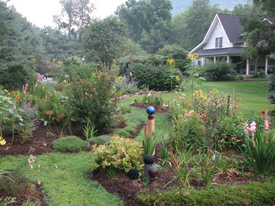AV's Intern Team | June 10, 2010 | No Comments
Jillian Varkas

Mulched flower beds offset the lawn areas at Sunflower Farm vacation rental in Barnardsville, N.C. Photo by Joan Naylor
If you are not convinced that organic gardening and knowing what goes into your ground is important, place a few sticks of celery in a cup full of water and add red food coloring.
After a few days, the celery will begin to turn red. That is what happens to our food; pesticides and chemicals are absorbed by our vegetables and are introduced into our bodies.
Organic gardening employs natural methods in caring for gardens without using synthetic fertilizers or pesticides.
Everyone can have a vegetable garden by following simple steps. Even folks who lack the space for a garden plot can grow simple vegetables in containers adding organic materials and natural fertilizers. Water them well, and those inexpensive seeds will provide baskets of produce.
Soil Test – Have your soil tested by a county extension service and take the steps recommended in the report to bring the chemistry of your soil into balance. It is easy to maintain proper balance.
You may need to add organic materials such as lime, manures, organic fertilizers and compost in order to grow crops successfully and improve the health of your plants.
Weeds – Learn about weeds and how to identify and manage them without chemicals. Corn gluten is an effective pre-emergent, and cider vinegar is an excellent weed killer.
Insects – Create a garden ecosystem that encourages beneficial insects to balance the population of the pests. If pests become a problem, use botanical insecticides, such as insecticidal soap and Neem products. For slugs and slimy critters, put out saucers of beer; they will crawl in, but not out. For fruit flies, put a banana peel into a plastic container, add a few holes in the top and you have an ideal fruit fly trap.
Compost – Start a compost bin or pile to recycle organic wastes and make a rich organic amendment for your soil; for organic gardeners, this is black gold! See our story below for tips on composting.
Use Native Plants – Learn about native and sustainable plants and make sure the plant matches the site in terms of soil, sunlight, moisture and other growing conditions.
By buying sustainable planting—those that closely match the environment—you will reduce your need for pesticides, fertilizers and additional water. Buy healthy plants from a knowledgeable source; ensure they are disease resistant and tolerant to your environment.
Sustainable Landscaping
Less lawn equals less fertilizer, pesticides and watering, so limite your lawn size. Consider the use of a native ground- cover in place of a lawn.
Use mulches, which are attractive and hold moisture into the soil, and hardscapes (walkways, gravel) for heavily traveled areas so that people are not compacting the soil and causing erosion.
Consider raised flowerbeds and raised beds for vegetables. Soil in raised beds generally warms up quicker in the spring and is easier to cultivate and to cover to protect plants from cold and wind. Raised beds are also ideal for incorporating water-saving drip irrigation systems, retaining moisture.
If you have an irrigation system, be sure to have a rain sensor and program it based on the temperature and sun in each of your growing months.
Construct an environmentally-friendly design, shape the land using its natural topography, select your plants and enjoy!
Like this content? Subscribe to The Voice email digests